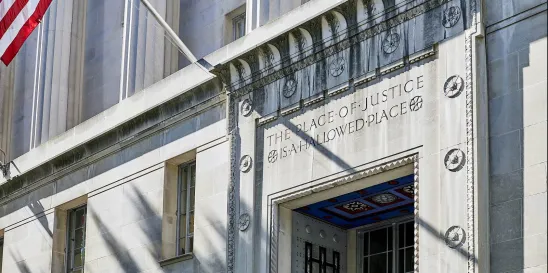Effective February 13, 2024, the U.S. Department of Justice (DOJ) increased civil monetary penalties, for violations occurring after November 2, 2015, including those related to immigration.
Quick Hits
- Effective February 13, 2024, the DOJ increased civil monetary penalties, including those related to immigration-related violations.
- While these increases are not as substantial as the immigration benefit request fees increase announced in January 2024, employers may still want to be aware of them.
The increase adjusts for inflation, in accordance with the Bipartisan Budget Act of 2015.
U.S. employers that employ a foreign worker or workforce are subject to immigration rules and regulations affecting work authorization, duration of employment, geographic limitations, and more. U.S. Citizenship and Immigration Services’ (USCIS) I-9 Handbook for Employers sets forth guidelines for complying with these regulations and penalties for violations. Typical violations include:
- Knowingly hiring an unauthorized worker after November 6, 1986, or knowingly entering into, renegotiating, or extending a contract or subcontract to obtain the labor of a noncitizen not authorized to work in the United States
- Failure to comply with Form I-9 and E-Verify requirements
- “Engaging in fraud or false statements, or otherwise misusing visas, immigration permits, and identity documents”
The DOJ and other relevant enforcement agencies become aware of violations of U.S. immigration regulations, including I-9 and E-Verify violations, in several ways including whistleblowers, USCIS special agent visits, Immigration and Customs Enforcement (ICE) officers’ site visits, and DOJ investigations. Violations can subject employers to civil and criminal penalties, including civil monetary penalties for immigration-related violations, such as the following:
Employer’s Failure to Notify of Final Nonconfirmation of Employee’s Employment Eligibility
If an employer participates in E-Verify, failure to notify the government of final nonconfirmation of employment eligibility and continuing to employ the individual may result in civil monetary penalties of no less than $973 and no more than $1,942 per relevant individual.
Paperwork Violations
A paperwork violation is a substantive violation or uncorrected technical or procedural failure in completing the Form I-9. Violations may result in a monetary fee of no less than $281 and no more than $2,789 per relevant individual.
Unfair Immigration-Related Employment Practices
Unfair immigration-related employment practices occur when an employer with more than three employees discriminates against anyone, other than an unauthorized alien, based on national origin or citizenship status. Violations may result in a monetary fee of no less than $575 and no more than $4,610 per relevant individual.
Unfair Immigration-Related Employment Practices, Unfair Documentary Practices
An employer may not request additional or different documents than those required by the I-9 verification process or refuse documents that “reasonably appear to be genuine.” Violations may result in a monetary fee of no less than $230 and no more than $2,304 per relevant individual.
The table below shows the increases from the 2023 civil monetary penalty amounts to the 2024 amounts.
| Name/Description | DOJ penalty assessed after January 30, 2023 | DOJ penalty assessed after February 12, 2024 |
| Failure to notify of final nonconfirmation of employee’s employment eligibility (per relevant individual) | $942 – $1,881 | $973 – $1,942 |
| Paperwork violations (per relevant individual) | $272 – $2,701 | $281 – $2,789 |
| Unfair immigration-related employment practices (first order, per individual discriminated against) | $557 – $4,465 | $575 – $4,610 |
| Unfair immigration-related employment practices, unfair documentary practices (per individual discriminated against) | $223 – $2,232 | $230 – $2,304 |
Source: U.S. Department of Justice, Civil Monetary Penalties Inflation Adjustments for 2024, 89 Fed. Reg. 9764 (February 12, 2024)
In determining the exact amount of the penalty, the DOJ will consider the size of the business of the employer being charged, the good faith of the employer, the seriousness of the violation, whether the individual was an unauthorized alien, and the history of previous violations.
Key Takeaways
While the civil monetary penalty increases are not as substantial as the immigration benefit request fees increase announced in January 2024, they serve as a reminder of the importance of maintaining compliance in the hiring and retaining of employees, as failure to do so can subject employers to, among other things, higher civil monetary penalties.




 />i
/>i

